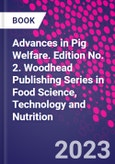Advances in Pig Welfare, Second Edition continues its complete coverage of the field with fully updated information and analysis of current issues in the key areas of pig welfare. It is a comprehensive review covering both recent developments and persistent welfare issues. The book has been expanded with 10 new chapters addressing the most relevant and significant issues in industry with a more global perspective.
The book is divided into four sections, starting with an introduction (Part 1) to major topics in pig welfare, such as pigs' needs, including affective states and positive animal welfare. Part two provides an overview of production systems and reviews welfare hotspots and mitigation. Part three covers pig welfare management topics, such as pig-human interactions and precision livestock farming. Global perspectives on pig welfare, including economics, legislation, farmers attitudes and climate change, are covered in Part 4.
Written by an international team of renowned researchers in the field, the book continues to be a useful resource for practicing vets involved in welfare assessment, welfare research scientists and students, and indeed, anyone with a professional interest in the welfare of pigs.
Please Note: This is an On Demand product, delivery may take up to 11 working days after payment has been received.
Table of Contents
Part One Introduction
1 Pigs' needs and wants
2 Pain in pigs: Characterisation and indicators
3 Stress in pigs: History, assessment, and interpretation
4 Affective states and cognition in pigs
5 Positive welfare: What does it add to the debate over pig welfare?
Part Two Pig welfare hotspots and mitigation
6 Overview of commercial pig production systems and their main welfare challenges
7 Mitigating hunger in pregnant sows
8 Sow longevity
9 Sow welfare in farrowing accommodation
10 Piglet mortality and morbidity: Inevitable or unacceptable?
11 Lifetime consequences of the early physical and social environment of piglets
12 Managing tail biting in pigs: Preventing risk factors or docking tails?
13 Gaining and maintaining interest: Recent advances in enrichment for pigs
14 Aggression in group-housed sows, weaners, and grower-finisher pigs
15 Transport of pigs to slaughter and associated handling
16 Slaughter of pigs
Part Three Pig welfare management topics
17 On-farm and post-mortem health assessment
18 Pig-human interactions: Creating a positive perception of humans to ensure pig welfare
19 Breeding for pig welfare: Opportunities and challenges
20 Precision livestock farming and technology in pig husbandry
21 Pigs as laboratory animals
Part Four Pig welfare from a global perspective
22 How much do people care about pig welfare, and how much will they pay for it?
23 Global developments in pig welfare: From legislation to market-driven change
24 The economics of pig welfare 000
25 Effects of climate change on pig welfare
26 Farmer attitudes towards pig welfare
Authors
Irene Camerlink Assistant Professor, Polish Academy of Sciences, Poland.Irene Camerlink
Dr Irene Camerlink is a researcher in animal behaviour and welfare, with a focus on the social behaviour of pigs. She conducted her PhD at Wageningen University (Netherlands) and thereafter worked as postdoctoral researcher at SRUC (Edinburgh, UK) and Vetmeduni, Vienna (Austria) before taking a position as Associate Professor (Hab.) at the Institute of Genetics and Animal Biotechnology of the Polish Academy of Sciences, Poland. She has over 65 peer-reviewed publications and is Editor-in-chief of the journal Applied Animal Behaviour Science. She is editor of the books 'Animal Welfare in Practice: Pigs' and 'Bridging Research Disciplines to Advance Animal Welfare Science'. Throughout her career she has studied pig behaviour and welfare by combining multiple disciplines such as genetics, ethology, behavioural ecology and social sciences.
Emma M. Baxter Associate Professor, SRUC (Scotland's Rural College), UK.Emma M. Baxter
De Emma Baxter is Associate Professor at SRUC, Edinburgh specialising in animal behaviour and welfare, with over 20 years of research experience particularly related to integrated pig science. Her main interests include; neonatal survival, developing alternative farrowing and lactation systems, implementing uptake of high welfare systems and practices and mitigating the health and welfare impacts of selection for production traits such as hyper-prolificacy. She has over 40 peer-reviewed publications and six book chapters. She works closely with industry with all sectors of the supply chain, providing consultancy and specialising in outreach to translate research into practice.







